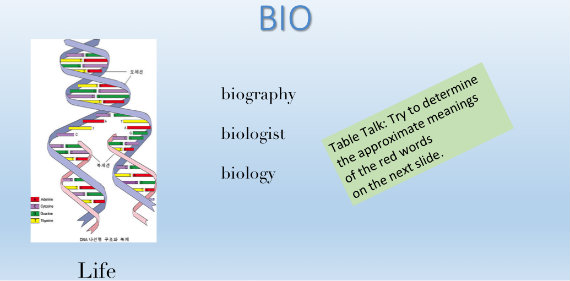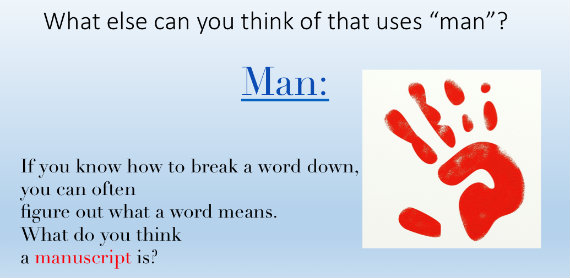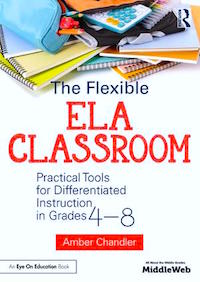Vocab: How to Rock Greek & Latin Roots

When you think of Greek and Latin roots, you think high student engagement, right?
No? Yep, me neither. However, year after year I have conversations with other teachers both in my district and elsewhere about the vocabulary deficit and the dramatic impact it is having on literacy across the board.

This year, I am going to do something about it, and yes, Greek and Latin roots are going to rock.
They were too polite to yawn
I had the opportunity to spend three days at AFT’s Summer Academy in Maryland as a part of a Resource Development Team, and there I created Word Study lessons that will help my 8th grade students learn how words are formed while I am addressing CCSS.ELA-Literacy.L.8.4.b: “Use common, grade-appropriate Greek or Latin affixes and roots as clues to the meaning of a word (e.g., precede, recede, secede).”
Even as I introduced myself and my project, the other participants were likely stifling a collective yawn, though they were polite enough to hide it from me. Yet, I forged on. I knew I could create Word Study days that were engaging, but I just needed to find the right approach.
Lots of media, plenty of collaboration
Here were my guiding principles as I developed the resources for my ELA classroom:
1) Media-Rich – videos, podcasts, and interactive experiences at my Smartboard and on Quizlet are a must. This is admittedly a dry topic, but at least I’ll be communicating in the trusted medium of Digital Natives.
2) Collaborative – I call it “Table Talk,” but my students will be collectively creating meanings and sharing their prior knowledge at key moments during the lessons. My hope is that not only will my students learn the new words that I introduce, but they will also listen to their peers’ language.
3) Rigorous – I’m going to tell it like it is here and in my classroom this fall. This isn’t easy, and I don’t want to pretend it is. It requires memorization, but I am providing the input strategies and sharing the interactive PowerPoints on my website for students to review and practice.
Every Monday is going to be a Word Study day. Videos are embedded in the PowerPoints introducing students to concepts of language development and acquisition itself. The first week’s video is “Why Is There a ‘B’ in Doubt?”, a short Ted-Ed video explaining how words change over time.
For most of my students, it will be the first time they have been exposed to words in this way. Ne dubitaris. We will rock!
Have you dared to go where many ELA teachers fear to tread? If so, we’d love to hear how you approach word study, and yes, Greek and Latin roots!
Feature image: Jamylle Brewton
Amber Rain Chandler teaches English Language Arts at Frontier Middle School in Hamburg, NY, a suburb of Buffalo. A certified School Building Leader, Amber also teaches Methods in English Teaching at Medaille College and leads staff development on Differentiation for the Southtown Teachers Center. She writes guest articles for MiddleWeb and blogs at her own website. Follow her on Twitter @msamberchandler.





































I checked the first unit you made out on ShareMyLesson, and I have to say, it is pretty awesome!
Next year, I will be doing many of the same activities with my students. In the past, with my 11th graders, we focused on “SAT”-type words with students. But next year, we will be focusing on student identification of common roots and the ways those roots are changed by prefixes/suffixes/tense shifts. Although I don’t feel that this will be the most exciting portion of my ELA curriculum, I think it will be incredibly valuable for students and will enable them to read more efficiently across all content areas.
My plan for this year, is slow and steady. One root every two days, and fun activities to practice the meanings, including students making up their own words!
I love the fact that l we do evolves over time! Slow and steady though = practical and realistic.
I highly recommend teaching roots. I specifically recommend a “Root of the Week” approach to complement/supplement text-related vocabulary. To find out more and access useful resources, check out the TLC “Root of the Week” page: http://www.literacycookbook.com/page.php?id=16
Thanks! I will definitely check it out. After 1st quarter, I need another plan, so this will help. Take care.
Thank you for this! I am an 8th grade English teacher who teaches Latin and Greek affixes. I incorporate a menu into my weekly vocabulary activities, and students have time throughout the week to collaborate on additional vocabulary challenges. I teach my students to break down each word as an equation and to think about connections as they combine affixes to predict definitions of new words. Students have reported using these skills in high school entrance exams, on testing, and in close reading across the disciplines. My students are ecstatic when they can use words like “anthropomorphic” in the classroom. Thank you for new ideas!
very nicely done! wow!
My 9th grade English teacher did this in 1969. Not the tech part, of course. But I have always credited her for helping me do well on my SAT Verbal exam. This is NOT new to me!
I believe in teaching greek and latin roots and wish every teacher in every grade level did that on their level. I teach sixth grade and my students come back later in their school careers and thank me because they have helped them in future coursework. This past year I incorporated raps! I gave students extra credit for coming up with and performing raps with the roots we were studying. I use an actual workbook for 6th grade from Educator’s Publishing Service. I help students link the roots they learn in reading class to their other classes. In science class students were learning about the dichotomous key. So we focused on di meaning apart and when we came to genus on the key they could understand that as well. I also had students make their own word webs and several students used their creativity to create trees. Their classmates loved them. I would like to have students use you idea and create their own visual for a certain root and give them freedom to select one they really want to become an expert in so that they can teach their peers.
I love those ideas. The rap sounds like a great buy-in for those “too cool for school” in 8th grade. Keep the ideas coming :)
My students at sixth grade loved creating word root monsters complete with visuals and also did a create an invention using word roots. For some of my most reluctant reading students they were loving these assignments because they could exhibit their creativity and artistic talent. Anything I can do to make learning Greek and Latin Roots exciting and fun is worth the effort. I use tickets in and out of the door to check for understanding and also offer extra credit for words that students bring from other subject areas that fit with our study of Greek and Latin Roots.
Be careful in thinking roots are in some words because it may not be from a Greek or Latin base. We have Anglo-Saxon and Heamic based as well. I have a teacher friend who did not consider this in lessons created before the Internet to check it out. Not cool showing another teacher is wrong when you share a kid. Just sharing it really opened my eyes to this. Look forward to incorporating your ideas.
I also do my word study on Mondays…I call it “Morphology Monday” :)
Where can I find your Lessons on Greek and Latin Roots? i”m writing lessons for 7th and 8th grade, and I’m struggling. Would love for you to share your lessons or just resources. I’m trying to find your blogs too, but i’m coming up empty.
Go to http://www.doyoudifferentiate.com. Click on Chapter Resources, then Vocab. All of the Greek and Latin Roots resources are there. You’all also find my most recent blogs linked there. Please let me know how I can help! It’s my favorite part of writing.